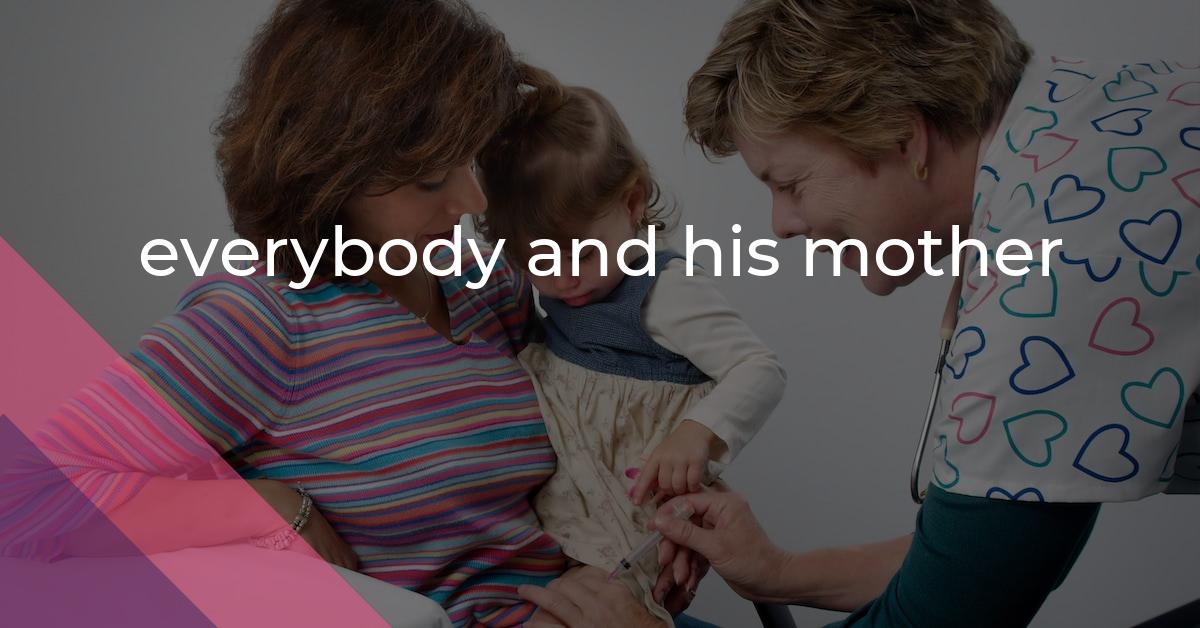everybody and his mother: Idiom Meaning and Origin
What does ‘everybody and his mother’ mean?
The idiom "everybody and his mother" means that a lot of people, and perhaps even more than necessary, are involved in a certain situation or event.

Idiom Explorer
The idiom "the whole world and his dog" means that a large number of people or a crowd of people, including unexpected ones, are present in a particular place or are interested in something.
The idiom "it takes all kinds to make a world" means that the world is diverse and made up of people with different characteristics, opinions, and behaviors.
The idiom "here, there and everywhere" means to be present or found in many different places or situations, often with little focus or purpose.
The idiom "every man Jack" means every single person, without exception. It emphasizes the inclusiveness and universality of a group or situation.
"Every last" is an idiom used to emphasize that every single person or thing in a group is included or accounted for. It highlights the completeness or thoroughness of an action or process.
The idiom "everybody who is anybody" means that only the most important or influential people are included or recognized in a particular group or situation.
The idiom "everybody and their brother" means a large number of people or a wide variety of individuals. It is used to emphasize the extent or inclusiveness of a group.
The idiom "everybody and his cousin" is used to describe a situation where a large number of people, often more than necessary, are involved or interested in something.
The idiom "by all accounts" means that according to everyone's opinions or reports about a particular person or situation, something is true or accurate.
Unforeseen Origins
First, let's take a look at the idiom "everybody and his mother." This colloquial expression is commonly used in American English and is a variant of the phrase "everybody and their mother," which has a similar meaning.
The phrase "everybody and their mother" is often used as an intensifier to emphasize the number or inclusiveness of a group. It suggests that not only a large number of people, but also their mothers, are involved or interested in a certain activity or event. This phrase is typically used in casual or informal contexts and is not appropriate for formal or professional writing.
The origin and etymology of this idiom are not well-documented. It's unclear exactly when or where the expression originated. However, it's possible that it emerged as an exaggerated extension of the more common phrase "everybody and their brother." This phrase, which has a similar meaning, has been in use since at least the early 20th century.
It's worth noting that idiomatic expressions involving family members are not uncommon in English. There are many idioms that involve family relationships, such as "skeletons in the closet" or "like father, like son." These idioms often use family references to convey meaning and imagery based on shared experiences and cultural associations.
The idiom "everybody and his mother" emphasizes the abundant or inclusive nature of a group. While its exact origin is uncertain, it likely emerged as an extension of the similar phrase "everybody and their brother." The use of familial references in idiomatic expressions is a common feature of the English language.
Now, let's talk about the related idiom "everybody and his cousin." This expression also emphasizes a large or inclusive group, but with a bit of a playful twist. The addition of the word "cousin" adds a sense of familiarity and camaraderie, suggesting that not only a lot of people, but also their extended family members, are involved or interested.
The phrase "everybody and their cousin" is often used in a similar way to "everybody and their mother," but it adds an element of lightheartedness. It implies that there's a strong sense of community or connection among the group, extending beyond just immediate family members. This idiom is especially popular in certain regions or communities where cousin relationships are traditionally strong.
Next up is the idiom "everybody and their brother." This phrase, similar to "everybody and their mother" and "everybody and their cousin," highlights the inclusiveness of a group. It suggests that not only a large number of people, but also their brothers, are involved or interested in a particular activity or event.
"Everybody and their brother" is a playful and informal way to emphasize that a lot of people are involved in something. The addition of the word "brother" brings a sense of closeness and familiarity to the idiom, as if everyone involved is part of a tight-knit community or family. This expression is often used in casual conversations or storytelling contexts.
The use of familial references in these idioms, such as "everybody and their mother," "everybody and their cousin," and "everybody and their brother," adds a relatable and friendly tone to the expressions. They tap into the shared experiences and cultural associations of family relationships, making them more conversational and engaging.
Lastly, let's discuss the idiom "everybody and their dog." This expression takes the inclusiveness of a group to an even greater extreme, implying that not only a large number of people, but also their dogs, are involved or interested in something.
"Everybody and their dog" is often used to suggest that a particular activity or event is incredibly popular or well-attended. It conveys the idea that almost everyone, including their furry companions, is participating or paying attention. This idiom adds a playful and light-hearted touch to emphasize the widespread nature of the involvement or interest.
The use of the word "dog" in this idiom brings a sense of fun and whimsy. It's a humorous way to exaggerate the size or enthusiasm of a group, and it can create a vivid mental image of a large crowd with dogs eagerly tagging along.
Idioms such as "everybody and his mother," "everybody and their cousin," "everybody and their brother," and "everybody and their dog" are colloquial expressions that emphasize the inclusiveness or abundance of a group. These idioms tap into the shared experiences and cultural associations of family relationships to create a conversational and engaging tone. While their specific origins may be uncertain, they are all examples of the rich and dynamic nature of the English language.
Example usage
Examples of how the idiom *everybody and his mother* can be used in a sentence include:
- Everybody and his mother knows about that famous celebrity.
- When the store announced a big sale, everybody and his mother showed up.
- At the concert, it seemed like everybody and his mother was singing along to the hit song.
The idiom is typically used to emphasize that a very large number of people are aware of something or are present at a certain event. It is often used informally in colloquial speech or writing to convey a sense of exaggeration or emphasis.
More "Familiarity" idioms



